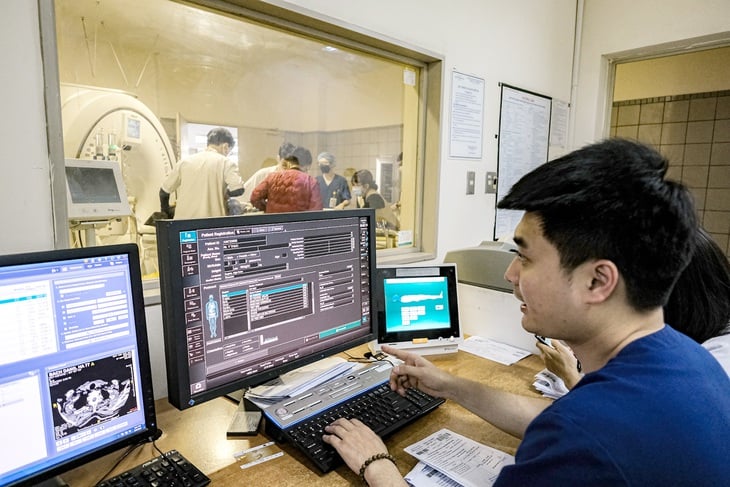
Bach Mai Hospital has deployed electronic medical records - Illustration photo: NAM TRAN
As of October 3, 881/1,645 hospitals nationwide had deployed electronic medical records before October 2, reaching 53.6% of the target assigned by the Prime Minister .
Achieved more than 50% of assigned targets
Having held the position of Director of the Department of Information Technology ( Ministry of Health ), currently Chairman of the Medical Informatics Association, Associate Professor, Dr. Tran Quy Tuong said that after more than 7 years since the Ministry of Health issued a circular regulating electronic medical records and nearly 7 months of implementing the Prime Minister's directive requiring 100% of hospitals nationwide to deploy electronic medical records (EMR) before September 30, 2025, the implementation has achieved initial results.
According to the Ministry of Health 's electronic information portal, as of October 3, 991 hospitals have announced the implementation of electronic medical records. Of these, 881 hospitals, reaching 53.6% (881/1,645 hospitals nationwide) announced the implementation of EMR before October 2 and are considered to have achieved progress according to the Prime Minister's direction.
However, 110 hospitals announced implementation after October 2 (some even as late as June 2026), which means they did not complete the project on time as required.
"Thus, despite many efforts, the progress of EMR implementation nationwide has not met the requirements and has not completed the "finish line" goal on time as assigned by the Prime Minister.
In the coming time, the health sector needs to coordinate more closely with Party committees and local authorities at all levels, come up with drastic and specific solutions, especially for the remaining 46.4% of hospitals that must urgently deploy EMR, ensuring the completion of the goal of digital transformation of healthcare according to the Government's direction," Mr. Tuong commented.
What are the challenges in implementing electronic medical records?
According to Mr. Tuong, there are some main difficulties and challenges in applying EMR records in Vietnam. Firstly, the financial mechanism is not clear. Deploying EMR in public hospitals requires a large initial investment, while the resources of hospitals are limited.
Currently, there are no specific guidelines on financial mechanisms for the application of medical information technology in general and the implementation of EMR in particular. The cost of medical services has not yet taken into account the cost of information technology, so hospitals mainly have to use the unit's development investment fund, affecting other essential activities.
Second, the digital infrastructure is not yet adequate, the foundation and information technology infrastructure of the Vietnamese healthcare sector is still weak and lacking, while this is a prerequisite for implementing EMR. This limitation causes a large total cost and requires the mobilization of many resources to be able to balance.
Therefore, it is necessary to take seriously the issue of "readiness" in EMR implementation, including policy, technical infrastructure, human resources and finance.
Third is changing habits and work processes. Applying EMR is not only a change in technology, but also a comprehensive change in the hospital's discipline, habits and work processes, from traditional manual methods to scientific and strict management methods in the digital environment.
This requires strong direction from hospital leaders and consensus and active response from all medical staff.
Besides, the cause is also due to the uneven attention of hospital leaders, limited information technology capacity of the medical team, etc.
Quickly complete financial policies and mechanisms
To promote the implementation of electronic medical records instead of paper medical records in hospitals, Mr. Tuong said it is necessary to synchronize a number of key solutions.
In particular, it is necessary to strengthen the drastic direction of the Ministry of Health. The Ministry of Health needs to continue to pay more attention and direct more closely the work of digital transformation of healthcare in general and the implementation of EMR in particular.
At the same time, complete the legal and policy framework, urgently develop, supplement and perfect mechanisms, legal documents, as well as professional guidance documents to support hospitals in deploying EMR in a unified, synchronous and effective manner.
Early promulgation of regulations on prices of medical examination and treatment services, in which information technology costs must be calculated correctly and fully. This is a key condition for medical examination and treatment facilities to have funding sources to invest, maintain and develop the EMR system.
In addition, the Ministry of Health needs to have specific regulations and sanctions for units and localities that do not properly implement the EMR implementation roadmap. At the same time, it is necessary to promote emulation and reward work, promptly encourage localities and hospitals to do well, thereby creating a spillover effect and a reference model for learning and sharing experiences.
In particular, hospital directors must fully understand the benefits and significance of EMR, thereby proactively and decisively implementing it. At the same time, it is necessary to ensure proper attention in allocating financial resources, IT human resources and annual investment plans for the system to ensure maintenance and effective operation.
There is a need for multi-sectoral and multi-stakeholder coordination; strengthening training and capacity building of health human resources in information technology.
EMR not only optimizes the medical examination and treatment process, improves the quality, efficiency and safety of medical services, but also significantly improves the experience of patients and medical staff.
"With the strong direction of the Government and the Ministry of Health, the close coordination of ministries, branches and localities, and the efforts of the entire health sector, the goal of successfully implementing electronic medical records nationwide is completely feasible," said Mr. Tuong.
Source: https://tuoitre.vn/gan-50-benh-vien-ca-nuoc-cham-cong-bo-trien-khai-benh-an-dien-tu-20251004181752363.htm



![[Photo] Prime Minister Pham Minh Chinh chaired a meeting of the Steering Committee on the arrangement of public service units under ministries, branches and localities.](https://vphoto.vietnam.vn/thumb/1200x675/vietnam/resource/IMAGE/2025/10/06/1759767137532_dsc-8743-jpg.webp)
![[Photo] Prime Minister Pham Minh Chinh chairs a meeting of the Government Standing Committee to remove obstacles for projects.](https://vphoto.vietnam.vn/thumb/1200x675/vietnam/resource/IMAGE/2025/10/06/1759768638313_dsc-9023-jpg.webp)



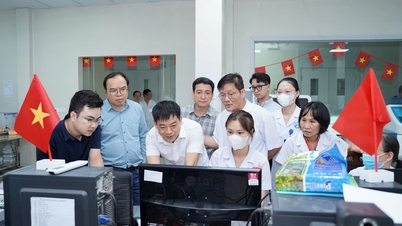

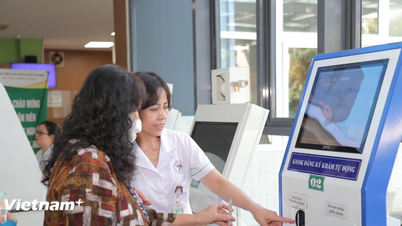

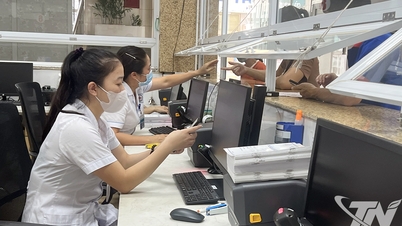



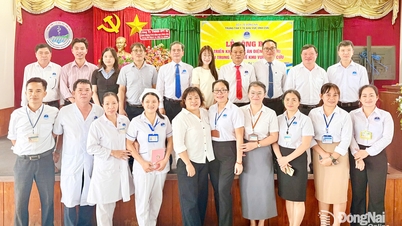








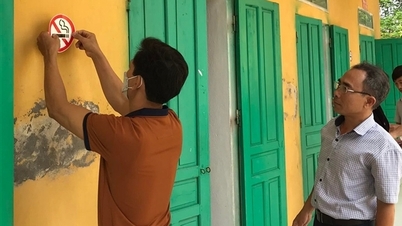

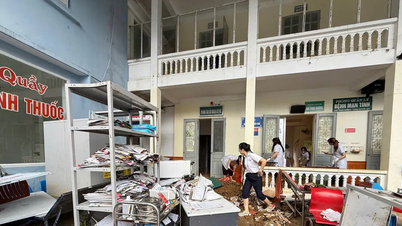
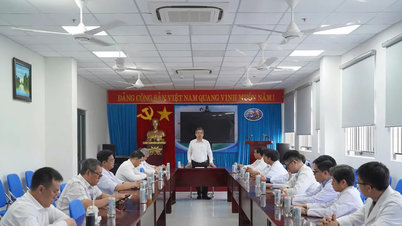


























































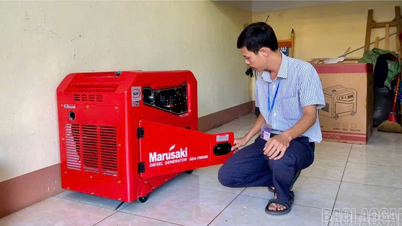


















Comment (0)